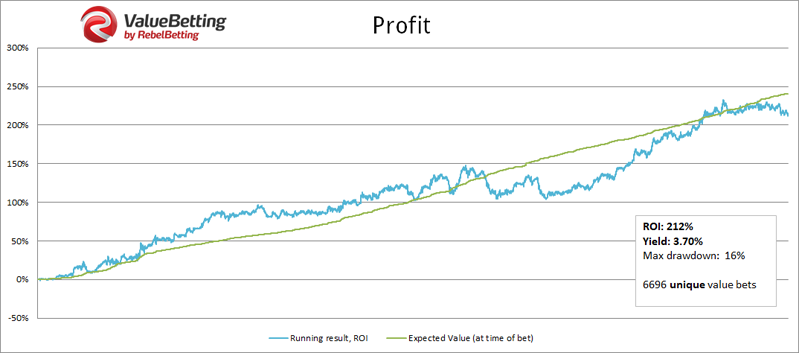Are you curious about the term ‘Value bet’ or ‘Value betting,’ but aren’t sure what it means or how to use it to your advantage in sports betting?
The concept of value in betting is closely tied to Expected Value (EV) — the long-term profit or loss expected from a particular bet or selection method. Value betting involves identifying opportunities where the odds suggest that a selection is less likely to win than it actually is, creating an edge in favour of the bettor and a positive Expected Value.
In this article, I’ll explain the concept of value betting and Expected Value in simple terms, using clear examples to show how to identify and take advantage of value odds as part of a disciplined betting strategy.
Article Contents
What Is Value Betting?
In sports betting, a value bet is one that is more likely to win than the odds suggest.
A value bet can be identified when a bettor believes that the probability of an event occurring is greater than the implied probability of the odds offered by the bookmaker.
For example, if a bookmaker offers odds of 2.00 on a football team to win, those odds imply a 50% chance of success (1/2.00). However, if the bettor believes the team’s actual chance of winning is 60%, this would be viewed as a value betting opportunity, and they would place a bet on the team to win.
Value betting is a fundamental strategy for anyone looking to succeed long-term, as it allows bettors to generate profits over time by consistently finding opportunities where the odds are in their favour.
Value betting applies to sports betting, poker, and other forms of gambling. In each case, the goal is to produce a positive Expected Value (EV), or player “edge,” over time.
Expected Value (EV) Explained
EV stands for ‘Expected Value’ — a mathematical concept used to determine the average profit or loss of a bet (or series of bets) by accounting for all possible outcomes and their probabilities.
Expected Value (EV) is a key concept in value betting, as it helps bettors identify opportunities where the odds are in their favour. For any bet you place, expected value can be summarised as follows:
- Positive EV or “plus EV”: The bet has a higher probability of winning than the odds suggest.
- Zero EV or “no EV”: The bet has exactly the same probability of winning as the odds suggest.
- Negative EV or “minus EV”: The bet has a lower probability of winning than the odds suggest.
In essence, a value bet is one where the expected value is positive (“plus EV”), meaning the bettor has an edge and, over the long run, stands to gain more than they lose.
How to Calculate EV
Expected Value (EV) is calculated by multiplying the real-life probability of an outcome by the potential payout, and then subtracting the probability of losing multiplied by the amount wagered, as follows:
Expected Value = (Win probability × Profit per bet) – (Loss probability × Loss per bet).
Here’s how this works in practice:
Example 1: +EV bet
If a bettor places a £100 bet on a team to win at odds of 3.0, believing the team has a 50% chance of winning, the potential payouts would be:
- Win: £300 return (£100 stake + £200 profit)
- Lose: -£100
Expected Value = (0.5 × £200) – (0.5 × £100) = £100 – £50 = £50
In this example, the expected value of the bet is £50, meaning the bettor might expect to make a profit of £50 for every £100 staked over the long run. Therefore, the expected ROI is 50%.
Example 2: 0 EV bet
If a bettor places a £100 bet on a team to win at odds of 2.0, believing the team has a 50% chance of winning, the payouts would be:
- Win: £200 return (£100 stake + £100 profit)
- Lose: -£100
Expected Value = (0.5 × £100) – (0.5 × £100) = £50 – £50 = £0
In this case, the expected value is £0, meaning the bettor would break even over the long run. The expected ROI is 0%.
Example 3: -EV bet
If a bettor places a £100 bet on a team to win at odds of 1.8, believing the team has a 50% chance of winning, the payouts would be:
- Win: £180 return (£100 stake + £80 profit)
- Lose: -£100
Expected Value = (0.5 × £80) – (0.5 × £100) = £40 – £50 = –£10
Here, the expected value of the bet is -£10, meaning the bettor would lose £10 for every £100 staked over the long run. The expected ROI is -10%.
The Importance of the True Win Probability
Without knowing the true win probability of an event, bettors can’t accurately determine fair odds or calculate the expected value (EV) of their bets.
Calculating the fair odds for sports events is extremely challenging — most bettors fail to consistently get it right.
Betfair Exchange odds are considered the most reliable benchmark for determining a fair price, backed by strong mathematical evidence. Typically, the ‘correct’ price can be found between the Back and Lay odds of a well-formed market, such as the Match Odds for Premier League games. Generally, the true price lies closer to the Back price, although this can vary depending on the market and situation. By comparing bookmaker odds to Betfair Exchange odds, bettors can better assess the value in their bets and spot profitable opportunities.
The major sharp sportsbooks are also widely regarded as a strong indicator of true probability, as their odds closely track the efficient prices found on major exchanges.
Learn why betting exchange odds are generally accurate.
Analysing Your Performance
To assess your profitability and expected value (EV), you need a large dataset of past betting results. A meaningful sample size allows you to make reliable assertions about your performance.
For example:
- £5,000 profit across £100,000 staked → +5% ROI.
- £5,000 loss across £100,000 staked → -5% ROI.
Bet size does not affect EV, but it does influence variance. Fewer, larger bets increase the risk of dramatic swings because each outcome carries more weight. A higher number of smaller bets spreads risk across more events, reducing volatility and giving results a better chance to align with expected value over time.
That’s why bankroll management is crucial. Even with a profitable strategy, poor management can wipe out gains. A common approach is to stake a fixed percentage of your bankroll on each bet — for instance, 2% per wager if you have a £10,000 bankroll (resulting in £200 stakes). This protects against heavy losses during inevitable losing streaks.
Another valuable tool is Closing Line Value (CLV) — the difference between the odds you placed and the odds just before the event starts. Consistently beating the closing line is a strong indicator that you’re finding value, even if short-term results fluctuate.
Advanced bettors may also apply the Kelly Criterion — a formula that calculates optimal bet size based on your edge and the odds. It aims to maximise long-term growth while controlling risk.
Why Do Value Bets Occur?
Value bets occur because bookmakers and betting markets don’t always set odds that perfectly reflect the true probability of an outcome. In other words, bookmakers or betting exchanges sometimes offer odds that are better or worse than the true probability, creating opportunities for value betting.
There are several reasons why bookmakers may not set perfectly efficient odds. These include:
- Public Opinion: Bookmakers can be influenced by public sentiment or media coverage, leading to overpriced or underpriced odds on certain teams or players.
- Early Prices: Bookmakers may initially offer odds designed to attract bets on both sides, rather than to accurately reflect true probabilities, creating early value opportunities.
- Betting Volumes: Bookmakers often adjust odds based on the volume and direction of bets, which can push odds away from their true value.
- Speed: Some bookmakers are slow to adjust to market changes, leaving temporary value gaps that savvy bettors can exploit.
Learn more about what causes value bets.
These same principles apply to crypto sportsbooks, where the pricing model largely mirrors that of traditional bookmakers. Because most major crypto operators benchmark their markets against the same data feeds, average pricing is often competitive — but inefficiencies and occasional value odds still appear, just as they do elsewhere.
How to Find Value Bets
Value bets (or “plus EV” bets) can be found at both bookmakers and betting exchanges.
Most bookmaker odds result in negative expected value (minus EV) because they include a built-in margin. By contrast, betting exchange odds are usually more accurate, creating a level playing field where bettors are neither advantaged nor disadvantaged on average.
See how I broke exactly even from over 270 random football bets on Betfair.
Because exchanges are efficient, opportunities are harder to find and highly competitive. This is why many bettors turn to “soft” bookmakers, where prices are less tightly controlled. However, these value odds disappear quickly, so acting fast is essential.
Here are the main ways to find value bets:
1. Use Value Betting Software
Value betting software scans multiple bookmakers in real time to spot price discrepancies that create +EV opportunities. These tools save hours of manual searching and greatly increase the chances of identifying profitable bets.
There aren’t many tools that are both public and genuinely profitable. I was given access to test the ValueBetting product by RebelBetting and found it extremely effective. The software tracks price movements across numerous bookmakers, flags +EV opportunities the moment they appear, and presents them in a live feed. It provides everything needed to build a structured, consistent strategy.
Over a large sample, RebelBetting produces profits in line with expected value
I’ve also reviewed the Trademate Sports software, another excellent option for value betting. You can read my full Value Bet Finder Review to compare both services.
2. Follow Legitimate Tipsters
Tipsters use data, expertise, and analysis to provide betting advice. Some specialise in finding value by spotting when the true probability of an outcome is greater than the odds imply. Following a proven tipster can help bettors gain an edge.
But not all tipsters are reliable. Predictions may be inaccurate, biased, or even dishonest. Always evaluate results carefully, look for transparency, and avoid anyone making unrealistic claims.
See my recommended tipster sites — but also review the risks of following tipsters.
3. Compile Your Own Odds
Bettors can calculate their own “fair odds” using stats, data, and research, then compare them with bookmaker prices to uncover value bets.
Tools like the AceOdds Calculator make it easy to convert probabilities into decimal odds.
This approach can form the basis of a system — such as targeting underdogs or spotting markets skewed by public sentiment. Advanced bettors also factor in things like player stats, injuries, form, and tactical setups.
However, not every system works. Testing and refining is critical before committing real money.
Learn the basics of football betting systems.
4. Master Sports Trading Techniques
Sports trading is another way to exploit value. For instance, a trader might back a team at long odds, then lay it at shorter odds once the market shifts, locking in profit. The reverse approach works too: lay first, then back later if the price moves favourably.
Trading demands speed and discipline but offers flexibility and avoids bookmaker restrictions, since exchanges like Betfair generally welcome winners.
See betting sites that do not restrict winning accounts.
Challenges & Limitations
Value betting, like any betting strategy, comes with challenges. Here are some common limitations:
- Inevitable losing streaks: Even with a +EV strategy, runs of losses will occur and can be emotionally and financially difficult to manage.
- Limited opportunities: Finding value bets requires time, effort, and access to a wide range of markets and bookmakers.
- Bookmaker restrictions: Bookmakers restrict accounts of bettors who consistently find value, limiting your ability to place bets.
- Betting limits: Different bookmakers impose staking caps that can restrict potential profits.
- Market efficiency: As awareness of value opportunities increases, odds move quickly and value disappears.
- Reduced value in major sports: Highly visible markets like top-flight football often have fewer value opportunities due to heavy analysis.
- Difficulty estimating probabilities: Assessing the true probability of outcomes is complex and prone to error.
- Emotional control: Chasing losses or staking irresponsibly can undermine even a sound strategy.
While value betting can be highly effective, understanding these challenges and managing your approach carefully is essential for long-term success.
Final Thoughts
Value betting is one of the most powerful strategies available to sports bettors — but it’s also one of the most demanding. Success requires consistently identifying value opportunities, accurately estimating probabilities, managing your bankroll wisely, and staying disciplined through inevitable swings.
Although the principles are straightforward, applying them successfully demands skill, patience, and a long-term mindset.
If you want to further develop your understanding of value betting and learn how to quantify your expected value (EV), I recommend reading these posts:
- Understanding Your Strike Rate
- The Importance of a Large Sample Size
- Differentiating Luck From Skill In Betting
- How to Mathematically Verify Betting Results
Originally posted on 7th September 2016.
- How Valuable Are Free Bets? Are They Worth It? - January 28, 2026
- MuchBetter | Gambling E-Wallet | Pros & Cons, Betting Sites - January 28, 2026
- How To Read Horse Racing Form | Beginner’s Quick & Easy Guide - January 27, 2026



